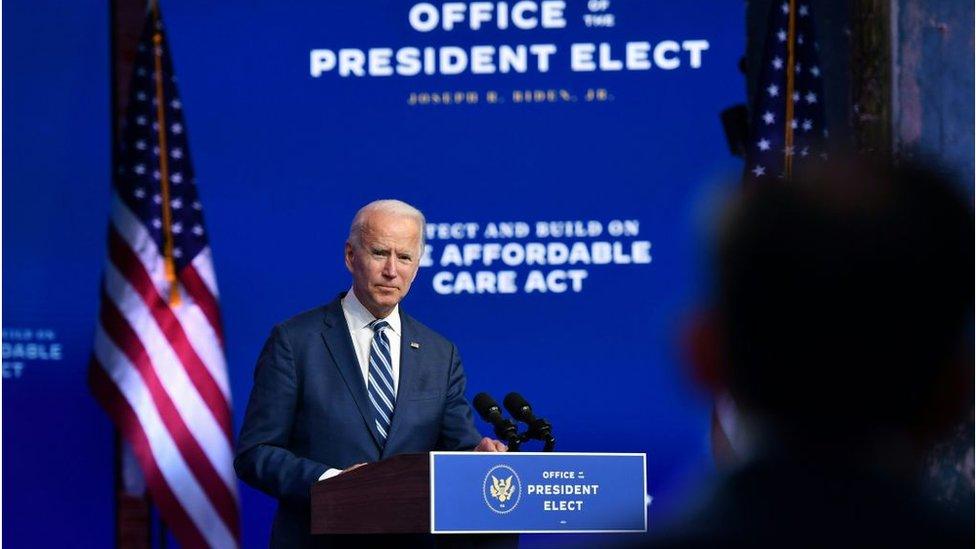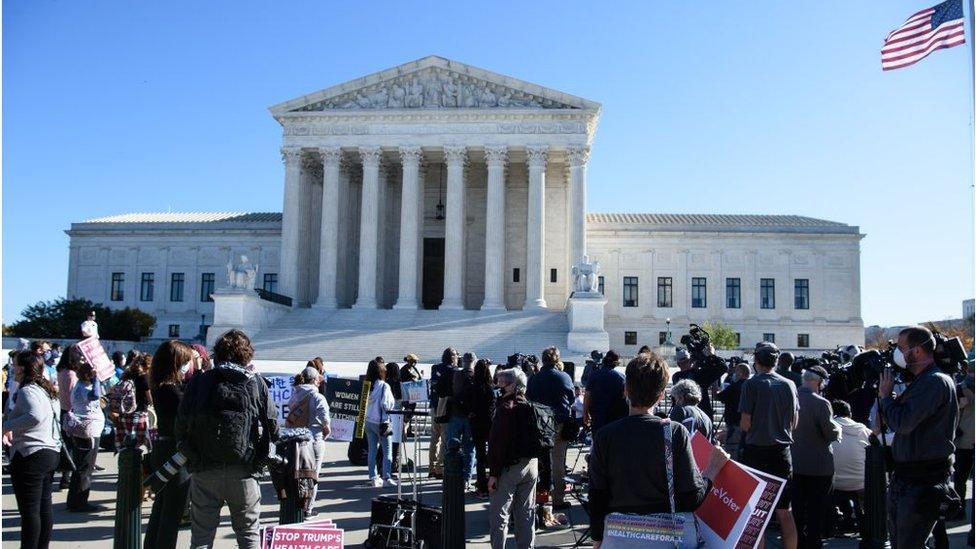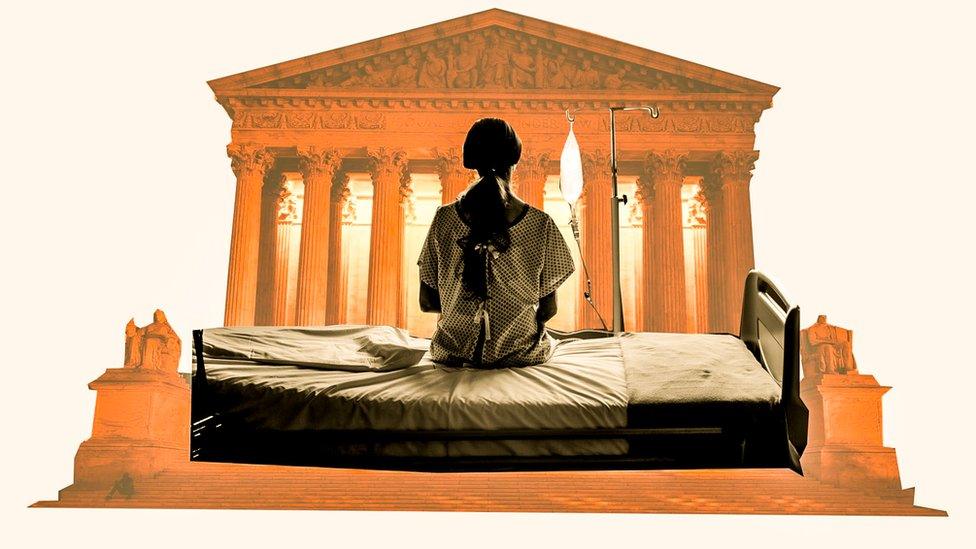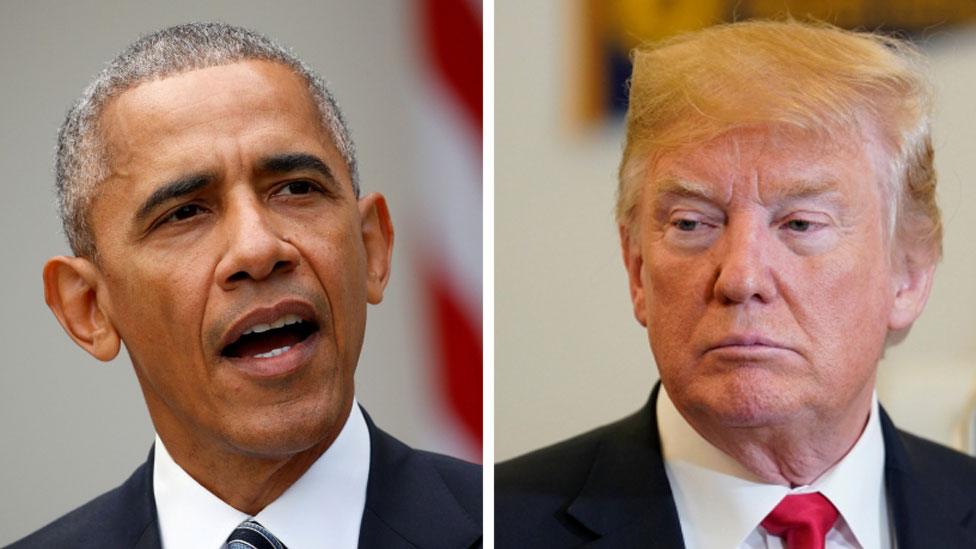Biden defends Obamacare as top court hears case
- Published
Biden: "Embarrassment" that Trump has not conceded the election
President-elect Joe Biden has vowed to defend the Affordable Care Act, the public health insurance scheme passed when he was vice-president, as the US Supreme Court considers a case attempting to strike down the law.
The Democrat said the court effort was an attempt by "far-right ideologues" to undermine access to healthcare.
The comments come as the US faces an unrelenting coronavirus pandemic.
Democrats made protecting the law a key election issue.
What did Mr Biden say?
"This case represents the latest attempt by the far-right ideologues to do what they have repeatedly failed to do for a long time," Mr Biden said in a speech where he addressed the Supreme Court case that opened with oral arguments on Tuesday.
There have been numerous attempts by President Trump to "erase the law" - popularly known as Obamacare - that have been rejected by Congress and in previous court cases, Mr Biden said.
"Now, in the middle of a deadly pandemic that has affected more than 10 million Americans....these ideologues are once again trying to strip health coverage away from the American people."
Healthcare has been a key issue for voters even before the pandemic and a key part of the Democratic platform, helping the party win a majority in the House of Representatives in the 2018 mid-term elections.
The Affordable Care Act (ACA) has remained popular overall - an October Kaiser Family Foundation poll, external that reported 55% of Americans viewed it favourably. A Pew Research Center report from September found 63% of US adults feel the government has a responsibility to provide health coverage for all - a rise from 59% last year.
Mr Biden noted that the nation is "more united on this issue than divided".

"This effort to bypass the will of the American people, the verdict of courts in the past, the judgments of Congress, in my view, is simply cruel and needlessly divisive," he said of the court case - and said that regardless of the outcome, his administration would work to expand public health coverage when he takes office.
Mr Biden also took questions from reporters on wide-ranging issues.
When asked about the transition from the Trump administration, Mr Biden said things were already "well underway".
"I think its an embarrassment," he said of the president's lack of concession. "I think it will not help the president's legacy."
He saw no need for legal action at this time, he said.
Mr Biden said he had spoken to six world leaders already, and let them know "America's back - we're going to be back in the game."
Addressing Mr Trump directly, Mr Biden said: "Mr President, I look forward to speaking with you."
What is the healthcare case about?
The case before the Supreme Court on Tuesday involves a dispute between a group of liberal states - led by California - who want to protect the law and a group of conservative states - led by Texas - who want to repeal the act.
The key issue is whether the ACA's requirement for people to have insurance or pay a tax penalty (known as the individual mandate) is constitutional or not.

Demonstrators at the Supreme Court on Tuesday
Though Republicans were able to strike down that penalty in 2018, the mandate to buy health insurance is still technically part of the law.
Conservative states that want Obamacare repealed - the plaintiffs in this case - argue that without the tax, the mandate is unconstitutional, and meaning that the whole law should be overturned.
The defendants say the act is constitutional despite the lack of penalty and that the plaintiffs do not have standing to challenge the mandate.
So, the questions before the court are:
Do Texas and the other conservative states have standing to challenge the act?
If so, is the mandate unconstitutional without the tax?
If the mandate is unconstitutional, then can the rest of the act remain without it, or should the whole thing be overturned?
Court analysts say that following the first day of oral arguments, it seemed unlikely that the court believed the whole of the law should be overturned. Chief Justice John Roberts and Justice Brett Kavanaugh both suggested in Tuesday's questioning that they may deal with the mandate separately from the rest of the act.
What's the big picture on Obamacare's future?
Republicans have unsuccessfully been trying to repeal the ACA for years, and President Trump ran in 2016 on a promise to repeal the law and replace it.
This has not happened. Instead, Mr Trump has sought to cripple the act in other ways, like cutting its budget, shortening enrolment periods and pushing "skinny" health plans with fewer benefits.
The Supreme Court has heard several cases on the ACA. In 2012, it upheld the act's constitutionality amid a question of whether the mandate penalty qualified as a tax.
As it stands, millions are protected by its provisions and 20m could lose their insurance if the act is overturned.
- Published18 October 2020

- Published29 March 2019
